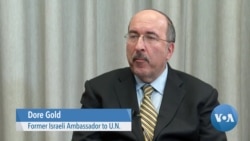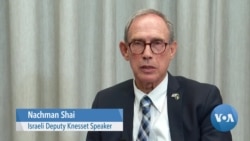U.S. Vice President Mike Pence says Washington’s pressure campaign against Iran is working, with Tehran increasingly losing its ability to support regional proxy militias.
Pence touted U.S. efforts to press Iran to end its perceived malign activities in a Friday speech to an annual conference of the Israeli American Council (IAC) in Hollywood, Florida. IAC is a nonprofit organization that seeks to build an “engaged and united” community among the more than half a million Israelis living in the United States. Israel, a close U.S. ally, is Iran’s main regional foe.
“As we speak, our actions are already cutting off the (Iranian) regime’s ability to support its terrorist minions across the region on an increasing basis,” Pence told an audience of several thousand in the main conference hall. “While Iran continues to pursue its evil aims, let me make a solemn promise to you, to Israel, and to the world: the United States of America will never allow Iran to obtain a nuclear weapon,” he added, to loud applause.
Trump and 'maximum pressure'
U.S. President Donald Trump launched his “maximum pressure” campaign against Iran in May, withdrawing from a 2015 deal among Tehran, the United States and five other world powers. Trump said the deal did not do enough to prevent Iran from developing nuclear weapons or engaging in other malign activity. Iran says its nuclear activities are peaceful.
Pence highlighted Trump’s decision to re-impose U.S. sanctions that had been lifted under the 2015 agreement, a process completed Nov. 5.
“We have imposed strong new sanctions, as well,” Pence said. “And American sanctions on Iran have never been stronger.”
In a Thursday presentation to the media in Washington, the Trump administration also unveiled what it said was more evidence of Tehran’s meddling in regional conflicts: pieces of missiles, rockets, drones and other Iranian weaponry, either recovered from Iranian proxies or interdicted on the high seas. It was the administration’s second such move, after U.S. Ambassador to the U.N. Nikki Haley presented a first display of alleged Iranian weaponry in December 2017.
Iran rejected last year’s U.S. presentation as a fabrication.
Iranian weapons transfers
“It is very important to give proof (of Iranian weapons transfers to proxies), and not just to make charges,” said Dore Gold, a former Israeli ambassador to the U.N., in an interview with VOA Persian on the sidelines of the IAC conference.
Gold said he sees a parallel between Iranian proxy activities in Yemen against Saudi Arabia, and Iranian proxy activities in Lebanon against Israel. “We and the Gulf (Arab) states have a similar interest in seeing these Iranian-supported organizations defeated or at least neutralized,” he said.
WATCH: Former Israeli Ambassador to the U.N. Dore Gold the latest U.S. display of alleged Iranian weaponry and its affect on U.S. efforts to combat Iranian proxies in the Mideast
Pence singled out two Iranian proxies that seek to destroy Israel in his speech.
“We recognize (that) terrorists across the region, from Hamas to Hezbollah, are really, truth be told, nothing more than proxies of a vile regime,” he said. “They are the pawns of Iran and its ayatollahs, who in recent years have devoted more than $16 billion to spreading violence, sowing chaos and bloodshed across the Middle East and the wider world.”
Iranian leaders long have called for Israel’s destruction and described their support for proxy forces as a means to that end. Iran also sees itself as a victim, rather than a perpetrator, of terrorism.
“I’m very glad Pence made reference to the dangers that Iran poses to the Arabian peninsula and of course to Israel,” said Gold, who served as director general of the Israeli foreign ministry from 2015 to 2016 and has been a longtime adviser to Israeli Prime Minister Benjamin Netanyahu.
Pence’s speech also was welcomed by Israeli Deputy Knesset Speaker Nachman Shai, a senior member of the main opposition Zionist Union bloc in the Israeli parliament.
In a separate interview with VOA Persian at the conference site, Shai said U.S. sanctions already imposed on Iran have caused many economic difficulties in the country.
WATCH: Israeli Deputy Knesset Speaker Nachman Shai's reaction to Vice President Pence’s tough rhetoric against Iran
“We appreciate very much the strong and unequivocal position of (the Trump) administration to stand next to Israel in order to stop Iran,” Shai said. “This is an international challenge, and it has to be done as soon as possible.”
This article originated in VOA’s Persian Service.







